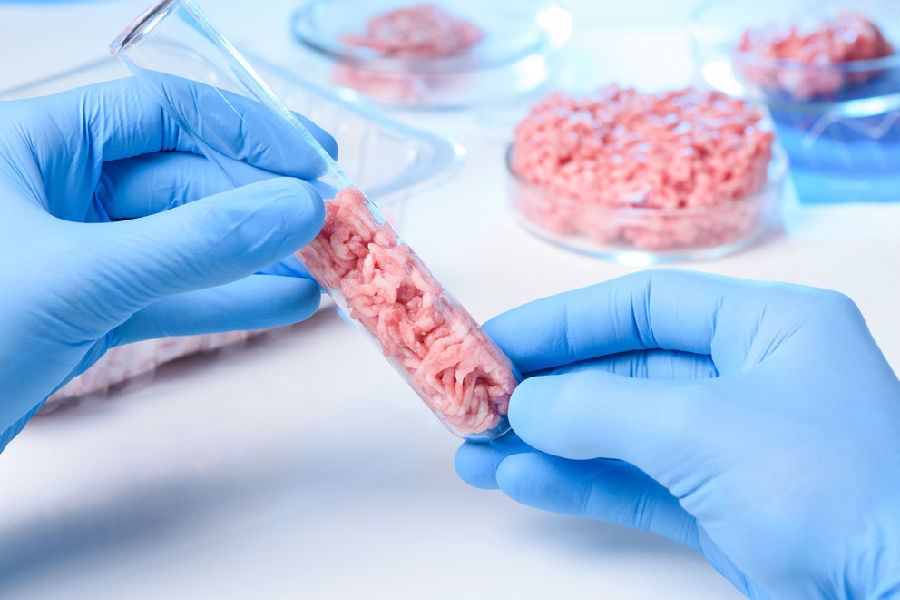Dialogue 1
Jingjing: Mark, have you heard about the new cellular meat?
京晶: 馬克,你聽說過最新研制的細(xì)胞肉嗎?
Mark: Huh? Is that some kind of mobile phone?
馬克: 什么? 那是某種新手機(jī)嗎?
Jingjing: No, it's a technology used to grow meat we can eat, without having to get it from animals.
京晶: 不,這是一項(xiàng)培育出食用肉的新技術(shù),無需再吃動(dòng)物肉了。
Mark: Oh yeah, I have heard about that. Food scientists are pretty close to a breakthrough, right?
馬克: 哦,對,我聽說過。食品學(xué)家已經(jīng)快要取得突破性進(jìn)展了,對吧?
Jingjing: I don't know if it's anywhere near ready to be put on the market. But I saw a video made by a company announcing that they've grown pieces of beef steak.
京晶: 我不知道這項(xiàng)技術(shù)是否已經(jīng)成熟到可以即將投入市場了。但是我看過一個(gè)公司制作的視頻,宣布他們已經(jīng)培育出了人造牛排。
Mark: I'm not clear, is that synthetic meat or was it really grown from natural cells?
馬克: 我不太明白,它是人造合成肉還是天然細(xì)胞培育出來的?
Jingjing: It was grown from natural cells.
京晶: 是用天然細(xì)胞培育出來的。
Mark: That's pretty cool! In a few years, I might not have to feel guilty about all the animals being killed for my diet.
馬克: 那太酷了! 也許再過幾年,我就不必為那些被屠宰而成為我盤中餐的動(dòng)物們感到內(nèi)疚了。
Jingjing: Right, a lot of people go vegetarian, or even vegan, to avoid all the cruelty involved in the meat industry.
京晶: 對,很多人都因?yàn)榈挚怪迫庑袠I(yè)的殘酷而堅(jiān)持素食主義甚至是純素食主義。
Mark: I respect that. But what about leather wallets and shoes?
馬克: 我很敬佩這種做法。但是我們使用的皮夾和皮鞋怎么避免呢?
Jingjing: Hmm, it's hard to keep animal products out of our lives. But I read somewhere that 60% of the biomass of mammals is livestock.
京晶:嗯…確實(shí)很難把動(dòng)物產(chǎn)品完全從我們的生活里隔絕出去。但是我讀到過, 60% 生物體量的哺乳動(dòng)物都是家畜。
Mark: We could definitely reduce that by eating less meat. This cellular meat might be a great alternative.
馬克:我們絕對可以通過少吃動(dòng)物肉來減少這個(gè)體量。這種新的細(xì)胞肉可能是一個(gè)很好的替代品。
Jingjing: Right. Instead of having to feed an animal with three to five times its weight in vegetables and grain and finally get meat, we could grow the meat in a lab.
京晶: 沒錯(cuò)。我們可以在實(shí)驗(yàn)室里培育肉,而不是通過用動(dòng)物體重三到五倍的蔬菜和谷物來喂養(yǎng)它們,最終獲得肉。
Mark: Let's hope the day comes soon.
馬克:希望這一天快點(diǎn)到來。
Jingjing: Yeah, I'll be following this issue in the news.
京晶:是啊,我會(huì)持續(xù)關(guān)注這項(xiàng)技術(shù)的進(jìn)展的。
New words : 習(xí)語短語
breakthrough 重大突破
a new discovery or way of making or selling something, a new accomplishment that can now be repeated
put (sth) on the market 首次進(jìn)入市場
sell something to the public for the first time
synthetic 人造的,人工合成物
made from chemicals rather than natural materials
vegetarian 素食者(不吃動(dòng)物肉)
a person who doesn't eat any meat
vegan 純素食者(不吃任何動(dòng)物制品,包括蛋奶)
a person who doesn't eat any animal products (including milk and eggs)
livestock 家畜
animals kept on farms
Dialogue 2
Jingjing: Mark, what do you think about the food of the future?
京晶: 馬克,你覺得“未來食物”怎么樣?
Mark: Thanks for sending me the link to that video. They tried to make cellular meat look quite luxurious. But I think it's more likely to replace baloney than filet mignon.
馬克: 謝謝你發(fā)給我的那個(gè)視頻鏈接。他們試圖讓細(xì)胞肉看起來很高級,但我認(rèn)為它更有可能取代熏肉,而不是菲力牛排。
Jingjing: That might be. But what if it tastes better than meat that comes from living animals?
京晶: 可能吧。但如果它們吃起來的味道來比來自動(dòng)物的肉更好呢?
Mark: Whatever tastes good, I'll eat—especially if there's no killing involved.
馬克: 只要好吃,我都會(huì)吃——尤其是能避免殺害動(dòng)物的話。
Jingjing: Haha. Do you consider yourself to be a conscientious consumer?
京晶: 哈哈。你認(rèn)為自己是一個(gè)有良心的消費(fèi)者嗎?
Mark: I'd like to think so. I try not to waste much, and buy only the things I need—and the same goes for food.
馬克: 我覺得我是。我盡量做到不浪費(fèi),只消費(fèi)我需要的東西——對于食物也是如此。
Jingjing: Right. I've eaten with you enough times to know you don't leave much on your plate.
京晶: 嗯。我和你一起吃過很多次飯,知道你不怎么剩飯。
Mark: It's good to know what impacts your food choices have on the environment. That's why I don't eat much beef.
馬克: 知道你的食物選擇會(huì)對環(huán)境產(chǎn)生什么影響,這樣很好。這就是我為什么不怎么吃牛肉的原因。
Jingjing: What's wrong with beef? I thought Americans liked it best.
京晶: 牛肉怎么了?
我還以為美國人最喜歡吃牛肉了。
Mark: I like it plenty, and can't pass up a burger once in a while. But, you know, it takes a lot more water to produce a kilogram of beef than it does to produce the same amount of pork or chicken. Also, the beef industry puts out a huge amount of greenhouse gas.
馬克: 我是很喜歡吃,而且每隔一陣兒也會(huì)抵擋不住誘惑吃個(gè)漢堡。但是,你知道么,生產(chǎn)一公斤牛肉需要的水比生產(chǎn)同等重量的豬肉或雞肉多得多。此外,生產(chǎn)牛肉還會(huì)排放大量的溫室氣體。
Jingjing: Oh, yeah. I was reading about that. Another surprised me: fish farming is also a huge producer of greenhouse gas.
京晶: 噢對,是這么回事,我讀到過。還有一件事也令我格外吃驚: 養(yǎng)魚業(yè)也是溫室氣體的一個(gè)巨大來源。
Mark: Really? How does that happen?
馬克: 真的嗎? 這是為什么?
Jingjing: Well, the fish are all close together in small ponds. Near the bottom of each pond, there's a lot of waste, and very little oxygen. Then gases like methane rise to the air.
京晶: 由于小池塘里的魚都緊密地聚集在一起,每個(gè)池塘的底部就會(huì)殘留很多排泄物,但氧氣很少。這樣就會(huì)產(chǎn)生像甲烷這樣的氣體,上升到空氣中。
Mark: Well, let's hope, in the future, most meat can be grown in labs, and that farm land can be used for wild animals.
馬克: 嗯,讓我們希望,未來大多數(shù)肉可以在實(shí)驗(yàn)室里被培育出來,而農(nóng)場的土地就可以留給野生動(dòng)物了。
Jingjing: Yeah. I'd give up today's meat to have something from the wild once in a while.
京晶: 是的。我寧愿放棄現(xiàn)在吃的肉,偶爾來點(diǎn)野味。
Mark: Same here.
馬克: 我也一樣。
New words : 習(xí)語短語
conscientious consumer 對環(huán)境負(fù)有責(zé)任感和良知的消費(fèi)者
a person who buys only the things that are less harmful to the world
pass up 錯(cuò)過做某事的機(jī)會(huì)
miss the chance to have
greenhouse gas 溫室效應(yīng)氣體 如二氧化碳,甲烷等 CO2,
methane, and other gases that contribute to global warming (aka the greenhouse effect)
n. 突破











